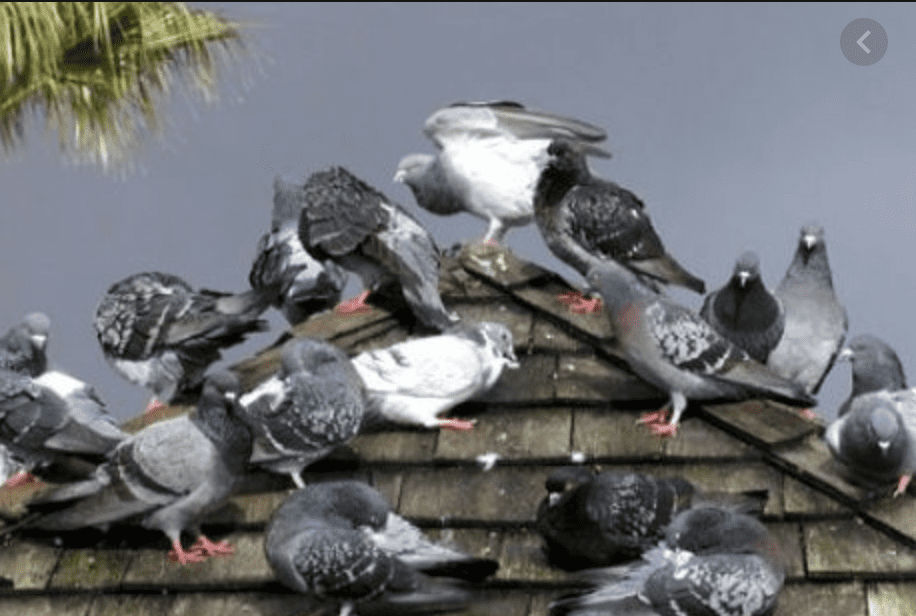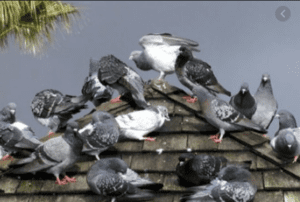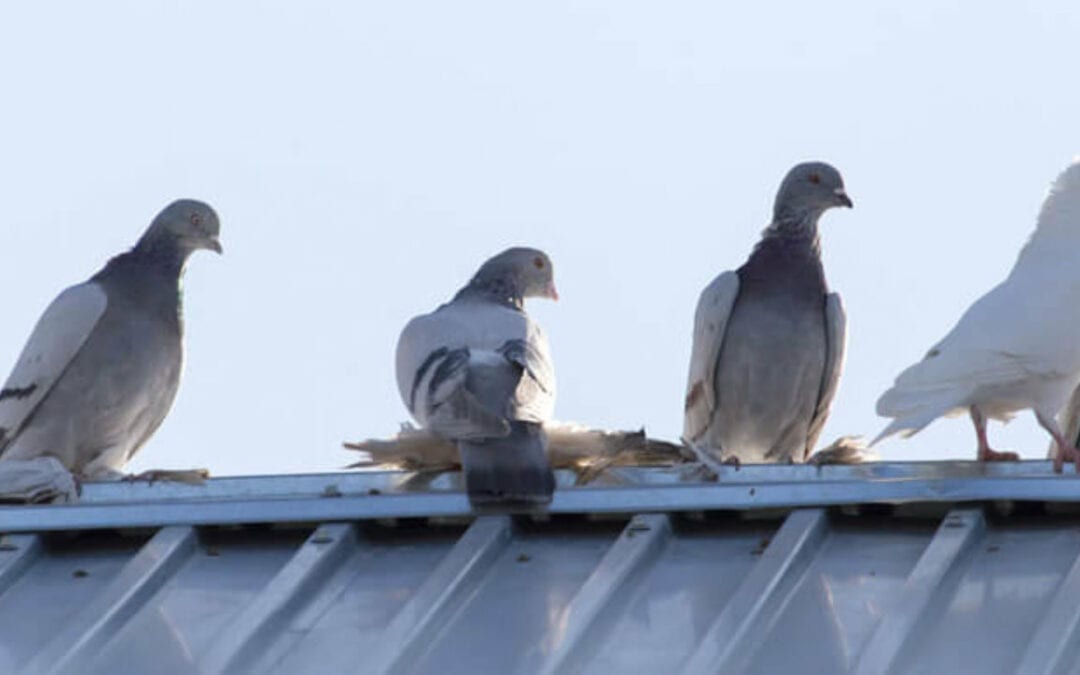
by Pigeon Patrol | Jul 5, 2021 | 4-S Gel Bird repellent, Animal Deterrent Products, Bird Deterrent Products, Bird Law, Bird Netting, Bird Spikes
A little experiment: What comes to mind when you hear the word “dove”?
Intimations of peace? The promise of hope after long hardship, à la Noah releasing a snow-white bird to gauge the waters of the flood? A kick-ass ice cream bar? Whatever the image, the association is likely positive. Beatific, even.
Now try another word. “Pigeon.”
If you’re like most people — and especially if you’re like most city dwellers — you probably get a bit skeeved out just hearing the word. Pigeons? They might not be vermin — not exactly — but they aren’t too far up the ladder, either. They eat trash. They crap everywhere. Stupid. Filthy. Rats with wings. Right? Sorry, but not quite. In fact, not even close. And thanks to Andrew Blechman’s consistently engaging and surprising new book, “Pigeons,” the seemingly dull, unlovely members of the Columbidae family — or, rather, their idiosyncratic and intensely loyal human proponents — now have a handy arsenal of lively anecdotes and plain old facts (heads up, wisenheimers: Pigeons are doves) with which to defend their long-maligned feathered friends.
Along the way, Blechman takes pains to chronicle the views of people for whom pigeons are, at best, a nuisance and, at worst, a plague. He spends a cold, taxing day in rural Pennsylvania among a community of men, women and children who enthusiastically and unapologetically shoot pigeons for sport, for food and even for charity. He chats with the owner of a South Carolina squab-processing plant for whom the birds are nothing more than meat divinely destined for ovens, frying pans and human gullets. (“All he cares about,” Blechman writes, “are breasts, because that’s where the meat is. ‘I want nice, well-rounded ones,’ he tells me. ‘I want big breasts.'”) And, evidently without having to search too far, Blechman finds and dutifully quotes those who, for reasons as numerous as bread crumbs in St. Mark’s Square, simply despise the red-legged head-bobbers that have learned to live (and, more universally than their human counterparts, thrive) amid the chaos of modern metropolises.
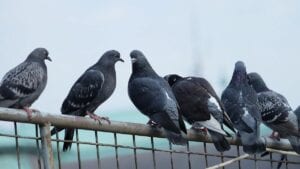
But despite his fair and balanced reporting on the many detractors of, as his book’s subtitle has it, “The World’s Most Revered and Reviled Bird,” make no mistake — Blechman himself is a Columbidae family man. While he was, by his own admission, neither anti- nor pro-pigeon when he began the peripatetic journey traced in the book, something clearly happened during his wanderings through the variegated, far-flung worlds of pigeonistas. Yes, the author dutifully records the myriad arguments for the bird’s obliteration. Sure, he eats fried pigeon, and enjoys it. Admittedly, he readies, aims and fires a shotgun at pigeons, and experiences the thrill of the hunt — or, more exactly, the thrill of standing still and blasting away at birds released from spring-loaded traps. But almost before the reader has settled in and begun to enjoy Blechman’s disarming, conversational style (“Some people like pigeons. But pigeons also piss a lot of people off”), the author’s enthusiasm for his subject starts flying right off the page. One almost pictures him beating imaginary wings as he expounds on the pigeon’s mind-boggling physical attributes and capabilities:
“With hollow bones containing reservoirs of oxygen, a tapered fuselage, giant breast muscles that account for one-third of its body mass, and an ability to function indefinitely without sleep, the rock dove [as many ornithologists have begun referring to the bird] is a feathered rocket built for speed and endurance. If an average up-and-down of the wing takes the bird three feet, then a racer is making roughly 900,000 of those motions during a long-distance race, while maintaining 600 heartbeats per minute — triple its resting rate. The rock dove can reach peak velocity in seconds and maintain it for hours on end. One pigeon was recorded flying for several hours at 110 mph — an Olympian feat by any measure.”
That Blechman repeats, with only slight variations, this litany of athletic gifts throughout the book is one of the few aspects of the tale that grows old. We get it! Pigeons are incredibly fast fliers that can remain on the wing at top speed for hours on end on the avian equivalent of fumes. Is there really anything more of interest to say about the animal? What else has it got? And does the creature actually warrant writing, and reading, a whole book?
Pigeons, it turns out, have lived closely with humans, in a perpetually evolving relationship — first as a handy and docile source of protein, then as an incomparably fast means of transferring information and, finally, as a focus of sport (racing and shooting) and a pastime (show breeding) — for perhaps 10,000 years. They’ve served as symbols of fertility, peace and renewal in religions from Christianity and Judaism to Greek, Babylonian and other Mediterranean and Middle Eastern cults and creeds, while practitioners of yoga have long invoked the bird’s winged shape while assuming poses like the One-Legged King Pigeon.
For millennia, rock doves helped lost seafarers point their crafts toward land when lost, for even though the bird “often dwells on coastal cliffs, it has an aversion to large bodies of water and always flies inland in search of food. A bird released from a ship will quickly orient itself to land, and early sailors undoubtedly followed suit.”
Of course, the bird’s astonishing homing skills have been used for as long as, if not longer than, recorded history to carry messages of victory (and defeat) in war, announcements of the ascension of new kings and pharaohs to the throne, and even warnings of floods along the Nile. Underground coops discovered in Israel, dating from the time of King Solomon, held an estimated 120,000 pigeons — at least a few of which were, presumably, used for purposes other than keeping David and Bathsheba’s son and his friends readily supplied with squab.
And then there’s the tale of the creation of one of the world’s largest news companies. It all started when a failed German businessman named Israel Beer Josaphat hit upon the idea of tying tiny little bags stuffed with news and stock market prices beneath the wings of homing pigeons flown between Brussels and Aachen, Germany. The train between the cities took eight hours, the birds less than two. Josaphat ultimately changed his name to Julius Reuter and created a news-gathering empire founded on (or beneath) the wings of rock doves.
But as edifying as these historical tidbits might be, and as much about the rock dove as the book might appear to be, the story of “Pigeons” is, ultimately, one of how people respond to the bird. In the best sense, Blechman’s book reads like a series of entertaining, eye-opening magazine pieces held together by the sinews, feathers and strong, hollow bones of the rock dove. Like so many of the surprisingly enthralling books written in recent years about one discrete, at-first-glance vapid topic — Mark Kurlansky’s “Cod,” Charles Seife’s “Zero: The Biography of a Dangerous Idea,” and innumerable others — “Pigeons” manages to illuminate not merely the ostensible subject of the book, but also something of the endearing, repellent, heroic and dastardly nature of that most bizarre of breeds, Homo sapiens.
Blechman has a shrewd eye and an ear nicely attuned to the peculiarities that reveal personality, and the human characters populating the pages of “Pigeons” are wonderfully and sympathetically drawn. From the friendly, unassuming pigeon breeders at the Grand Nationals competition held at a Lancaster, Pa., hotel, to the clearly obsessed trainers and owners of racing pigeons in the Bronx and rural England and beyond, to the happy, driven rescuer and champion of rock doves who lives in a squalid home in Arizona literally dripping with not-quite-calcified pigeon shit, the pro-bird folks who pop up in “Pigeons” make avid cat and dog people seem, well, tame in comparison.
“Sweetie, a pigeon the size of a small turkey, is pacing back and forth on what used to be a Formica kitchen counter,” Blechman writes of a bird who makes her home with Dave Roth, the one-man rescue mission and Jerry Garcia look-alike of Phoenix, Ariz. “Roth nuzzles her. ‘That’s my girl. You’re such a sweetie, aren’t you?’ He turns to face me. ‘If everybody could experience this kind of a relationship with a bird, then we wouldn’t have all the problems we have today with the pigeon haters. Pigeons can be funny, animated, and loyal like a dog. You’d be amazed.'”
This kitchen counter encounter, which appears at just about the exact halfway point of the book, is emblematic of much that’s weird and humorous and even a little unsettling about Blechman’s tale. If you’re somehow still on the fence about pigeons until this point, you’ll probably fall hard and fast on either side once you’ve spent a little time with Dave Roth. (Of eating squab, Roth opines that it’s “like Jeffrey Dahmer eating your kid.” Roth, it’s worth noting, is a bachelor. And childless.)
Finally, as fate would have it, at pretty much the exact same time that Blechman’s book was hitting bookstores, several research studies found that (wait for it) pigeons are vastly more intelligent than anyone, even most pigeon fans, have given them credit for.
“Pigeons are no slouches,” said Robert G. Cook of Tufts University, coauthor of a study that found that pigeons can remember more than 1,000 individual images. Another study showed that pigeons evidently possess the ability to compare relationships — such as sameness or difference — rather than merely identifying distinct images or objects. Researchers claimed that the ability, previously observed and quantified only in humans and a handful of other higher mammals, is a form of analogous thinking — primitive, but nonetheless exceedingly rare in the animal kingdom.
Rats with wings? Affectionate companions? Idiotic pests? Miraculous navigators? Tasty eats? Blechman’s “Pigeons” flies in the face of conventional wisdom about a symbolically freighted bird that, if we thought about it at all, we thought we knew. Time to think again.
Source
Pigeon Patrol Products & Services is the leading manufacturer and distributor of bird deterrent (control) products in Canada. Pigeon Patrol products have solved pest bird problems in industrial, commercial, and residential settings since 2000, by using safe and humane bird deterrents with only bird and animal friendly solutions. At Pigeon Patrol, we manufacture and offer a variety of bird deterrents, ranging from Ultra-flex Bird Spikes with UV protection, Bird Netting, 4-S Bird Gel and the best Ultrasonic and audible sound devices on the market today.
Voted Best Canadian wholesaler for Bird Deterrent products ten years in a row.
Contact us at 1- 877– 4– NO-BIRD, (604) 585-9279 or visit our website at www.pigeonpatrol.ca
Pigeon/Pigeon Patrol / Pigeons Roosting / Vancouver Pigeon Control /Bird Spikes / Bird Control / Bird Deterrent / Pigeon Deterrent? Surrey Pigeon Control / Pest /Seagull deterrent / Vancouver Pigeon Blog / Birds Inside Home / Pigeons in the cities / Ice Pigeons/ What to do about pigeons/ sparrows , Damage by Sparrows, How To Keep Raccoons Away, Why Are Raccoons Considered Pests/ De-fence / Pigeon Nesting/ Bird Droppings / Pigeon Dropping/ woodpecker control/ Professional Bird Control Company/ Keep The Birds Away/ Birds/rats/ seagull/pigeon/woodpecker/ dove/sparrow/pidgeon control/pidgeon problem/ pidgeon control/flying rats/ pigeon Problems/ bird netting/bird gel/bird spray/bird nails/ bird guard

by Pigeon Patrol | Jul 5, 2021 | MBCA, pet bird, Pigeon Control, Pigeon Droppings, Pigeon Patrol's Services, Pigeon Predators
ANAND/AHMEDABAD: Five members of a family in Anand died of asphyxiation inside a dry well when they went down to save a baby pigeon, on Wednesday. A pall of gloom descended over Jhalaborda village after the tragedy.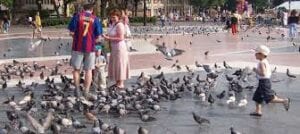
“The five died due to asphyxiation, possibly caused by the presence of gases trapped in the abandoned well. Forensic investigators have been called to the spot to tell us what exactly caused the deaths inside the well,” said AK Sharma, deputy inspector general of police, Ahmedabad division.
The tragedy unfolded with a farmer Pratapsinh Chauhan, 48, spotting a baby pigeon, which accidentally hopped into the well at his farm. Pratap decided to go down the well to rescue it.
“Pratap wanted to rescue the bird and climbed down the well. Some aged farmers working at the neighbouring farm saw him and went down the well to rescue Pratap when he did not emerge,” said an official of Umreth police station.
Pratap was followed down the well by Sana Parmar, 65 and Khiman Parmar, 70. When the farmers failed to return, their family members — Natwar Parmar, 33, Gita Parmar, 32 and Shankar Parmar, 25 — climbed down the dry well to rescue their kin.
Except for Pratap, on one returned alive. When the six persons failed to turn up, the villagers panicked and called for help. All the six were taken out of the well with help of police and Umreth fire brigade personnel.
The victims were rushed to a hospital in Nadiad where the Parmars were declared ‘brought dead’.
Mysteriously though the rescue workers who got the victims out of the dry well said, “We could not locate any pigeon down there.”
Umreth police officials who are investigating the case said, “Only Pratap can tell us why he went down the well. He is unconscious and under treatment.”
Source
Pigeon Patrol Products & Services is the leading manufacturer and distributor of bird deterrent (control) products in Canada. Pigeon Patrol products have solved pest bird problems in industrial, commercial, and residential settings since 2000, by using safe and humane bird deterrents with only bird and animal friendly solutions. At Pigeon Patrol, we manufacture and offer a variety of bird deterrents, ranging from Ultra-flex Bird Spikes with UV protection, Bird Netting, 4-S Bird Gel and the best Ultrasonic and audible sound devices on the market today.
Voted Best Canadian wholesaler for Bird Deterrent products ten years in a row.
Contact us at 1- 877– 4– NO-BIRD, (604) 585-9279 or visit our website at www.pigeonpatrol.ca
Pigeon/Pigeon Patrol / Pigeons Roosting / Vancouver Pigeon Control /Bird Spikes / Bird Control / Bird Deterrent / Pigeon Deterrent? Surrey Pigeon Control / Pest /Seagull deterrent / Vancouver Pigeon Blog / Birds Inside Home / Pigeons in the cities / Ice Pigeons/ What to do about pigeons/ sparrows , Damage by Sparrows, How To Keep Raccoons Away, Why Are Raccoons Considered Pests/ De-fence / Pigeon Nesting/ Bird Droppings / Pigeon Dropping/ woodpecker control/ Professional Bird Control Company/ Keep The Birds Away/ Birds/rats/ seagull/pigeon/woodpecker/ dove/sparrow/pidgeon control/pidgeon problem/ pidgeon control/flying rats/ pigeon Problems/ bird netting/bird gel/bird spray/bird nails/ bird guard
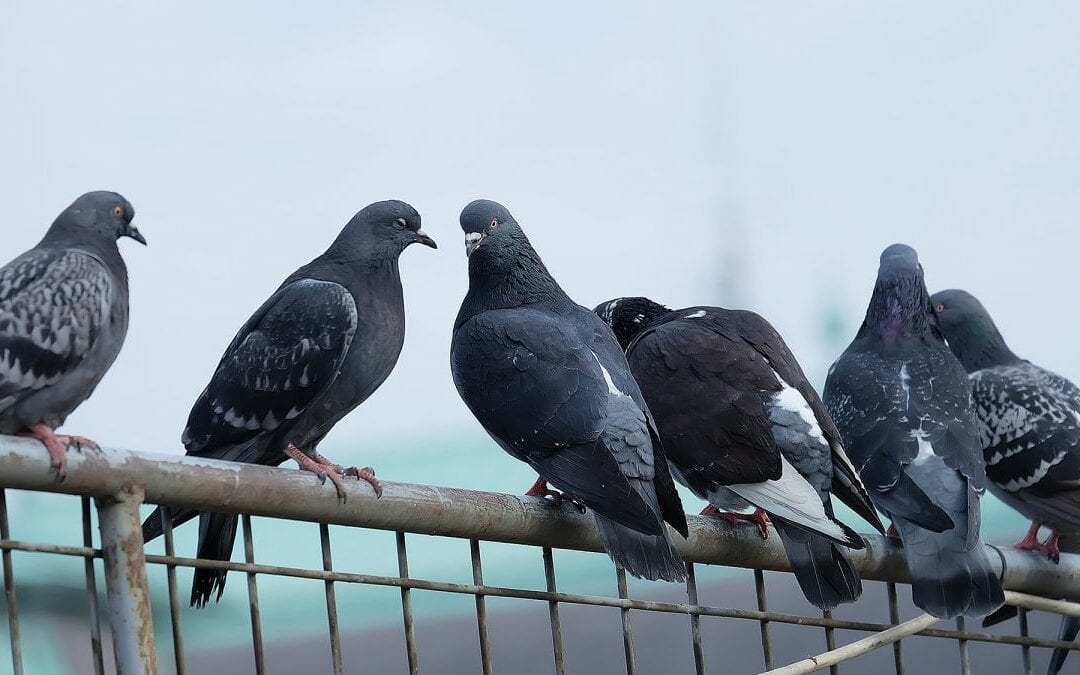
by Pigeon Patrol | Jun 28, 2021 | Bird Netting, history of pigeons, MBCA, pet bird, Pigeon Droppings, Pigeon Patrol's Services
Pigeons (or rock doves), ubiquitous urban birds, are the descendants of birds brought from Europe centuries ago who escaped from captivity and reverted back to the wild. Many city residents and visitors find pigeons pleasant and interesting.
Pigeon Facts
Pigeons mate for life, and both parents care for their young. They flock in large numbers in order to protect themselves from predators. Pigeons naturally stabilize their own populations in accordance with the food supply and other factors. They can fly up to 50 miles per hour and can travel up to 500 miles in one day.1 Their hearing and vision are both excellent.
Pigeons’ navigational abilities, which are largely dependent on keen vision and a superlative memory for topographic details, are legendary. A 10-year study of pigeon flight patterns conducted at Oxford University found that the birds rely more on their knowledge of human transport routes than on their internal magnetic compasses; one scientist said, “We followed some which flew up the Oxford bypass and even turned off at particular junctions. It’s very human-like.”2 One behavioral psychologist who studies pigeons remarked, “Pigeons commit new images to memory at lightning speed. . . . They organize images of things into the same logical categories that human beings use when we conceptualize.”3
The Disease Myth
The most widespread misconception about urban pigeons is that they are carriers of disease. Pest-control companies charge them with transmitting any number of diseases, but the truth is that the vast majority of people are at little to no health risk from pigeons. A search of epidemiological studies over more than 60 years found so few cases of diseases transmitted from feral pigeons to humans that the researchers concluded, “Although feral pigeons pose sporadic health risks to humans, the risk is very low, even for humans involved in occupations that bring them into close contact with nesting sites.”4
Histoplasmosis, cryptococcosis, and psittacosis are diseases that can be transmitted to humans from contact with bird feces, but the risk is considered to be small, with people who have compromised immune systems at the greatest risk.5 Psittacosis is usually associated with parrots in captivity.6
Poison Does Not ‘Control’ Pigeons
When people contact pest-control companies for advice on how to resolve conflicts with birds, operators often recommend using avicides, or bird poisons, such as Avitrol and DRC-1339, to “control” bird populations. Companies often tell potential customers that Avitrol and other avicides are “flock-dispersing agents” that “scare” birds away from areas where they are not wanted. They’ll even tell customers that these products are humane, but nothing could be further from the truth. Avicides such as Avitrol are acutely toxic and cause birds and other animals to suffer immensely. Avitrol attacks and impairs birds’ nervous systems. This causes birds who ingest the poison to become disoriented, exhibit erratic flight and tremors, and suffer violent convulsions for hours before they finally succumb to the effects of the toxin. Avitrol has been banned in New York City; San Francisco; Boulder, Colorado; and Portland, Oregon.7
A study published in the journal Veterinary Microbiology cautioned that killing pigeons “by shooting or poisoning is both unethical and ineffective as the place of the killed birds in the population is quickly filled by new juveniles or immigrating birds from neighbouring areas.”8 Any successful method of bird control must concentrate on prevention and making the location inhospitable to birds.
What You Can Do
For starters, don’t feed birds, and eliminate food and litter from the area. Excluding birds from an area and conditioning them to avoid the area are both effective, humane ways of dealing with a pigeon overpopulation problem. Conditioning birds to avoid an area should be done as early as possible in order to effectively discourage the birds from settling in.
Very simple modifications in a building’s structure can discourage birds from landing or nesting on the building. Steel, wood, or stone angled on building ledges prevents pigeons from nesting there. Open areas, such as vents, lofts, or eaves, can be sealed up to prevent pigeons from nesting in them. Bird barriers, including a thin metal coil that resembles a “slinky” toy, can be fastened to a building ledge to discourage birds from landing.
NEVER use sticky, transparent, bird “repellent” caulk. This substance is applied to ledges in the hope that birds will land, feel the stickiness of the caulk, and fly off, never to return. It is extremely dangerous because birds can easily get stuck to the ledges and lose wings or legs as they try to free themselves, or their wings may stick to their bodies, causing them to fall when they try to fly. They can also ingest the substance while cleaning themselves and die of poisoning.
Visual deterrents such as revolving lights, mirrors, or effigies of predator birds can also be effective.
Source
Pigeon Patrol Products & Services is the leading manufacturer and distributor of bird deterrent (control) products in Canada. Pigeon Patrol products have solved pest bird problems in industrial, commercial, and residential settings since 2000, by using safe and humane bird deterrents with only bird and animal friendly solutions. At Pigeon Patrol, we manufacture and offer a variety of bird deterrents, ranging from Ultra-flex Bird Spikes with UV protection, Bird Netting, 4-S Bird Gel and the best Ultrasonic and audible sound devices on the market today.
Voted Best Canadian wholesaler for Bird Deterrent products ten years in a row.
Contact us at 1- 877– 4– NO-BIRD, (604) 585-9279 or visit our website at www.pigeonpatrol.ca
Pigeon/Pigeon Patrol / Pigeons Roosting / Vancouver Pigeon Control /Bird Spikes / Bird Control / Bird Deterrent / Pigeon Deterrent? Surrey Pigeon Control / Pest /Seagull deterrent / Vancouver Pigeon Blog / Birds Inside Home / Pigeons in the cities / Ice Pigeons/ What to do about pigeons/ sparrows , Damage by Sparrows, How To Keep Raccoons Away, Why Are Raccoons Considered Pests/ De-fence / Pigeon Nesting/ Bird Droppings / Pigeon Dropping/ woodpecker control/ Professional Bird Control Company/ Keep The Birds Away/ Birds/rats/ seagull/pigeon/woodpecker/ dove/sparrow/pidgeon control/pidgeon problem/ pidgeon control/flying rats/ pigeon Problems/ bird netting/bird gel/bird spray/bird nails/ bird guard
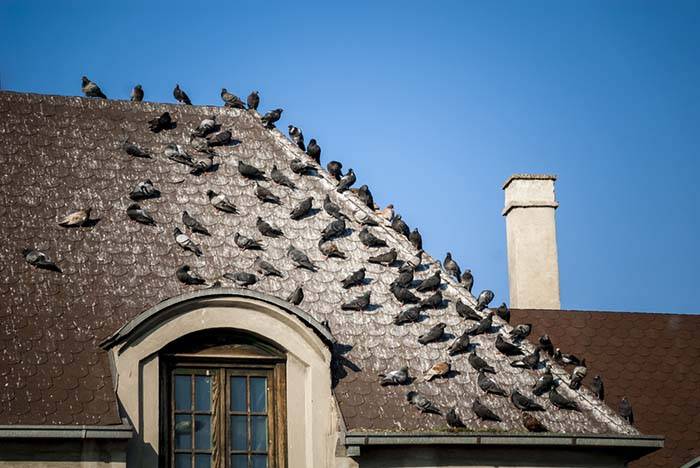
by Pigeon Patrol | Jun 28, 2021 | 4-S Gel Bird repellent, Animal Deterrent Products, Bird Deterrent Products, Bird Law, Bird Netting, Bird Spikes
Pigeons are not pets! Feral pigeon nuisance is becoming a major problem in North America. They are not afraid of people and roost in almost any area where there is a food source. Where they eat, they leave droppings and the feral pigeons in the city and rural areas are associated with a variety of allergens, bacteria, and other health hazards.
Feeding Pigeons Destroys the Ecosystem
Many people enjoy feeding and watching feral birds, but they are unaware that they may be causing more harm than good. Feeding pigeons creates unnaturally large pigeon populations, and overcrowding can cause disease outbreaks in humans and other wild birds. Keeping a food source around your home for feral pigeons should be discouraged. Pigeons are scavengers and providing them with scraps can result in a nutritional deficiency, and they lose their natural ability to travel elsewhere to find food.
Nothing but Pigeon Poop
A typical pigeon dispenses about 25 pounds of fecal matter per year. Pigeon-related damage costs cities and homeowners for pest control and sanitation, but an even more dire reminder why you shouldn’t feed them are the diseases that can be spread from the droppings. Even with the spikes, nets, and barriers, pigeon-proofing has become a major undertaking. Feral pigeons lay eggs six times a year, and breed more rapidly when near a major food source. In some cities, feeding pigeons is illegal. If you have ever had to clean up after pigeons, you would realize if you don’t feed them they will leave and find their own food source!
Breaking the Habit
Pigeon-lovers are being blamed for the continuous list of complaints about pigeon infestation in major cities across Canada. Even tourists love feeding the pigeons, but they are ruining the building facades and monuments and continue to escalate sanitation costs. Power washing the aluminum or brick on your home is also costly. Pigeons are intelligent and will remember if they are fed. They will return and roost and find a place to nest. Eventually, you will be left with the droppings, and if an infestation occurs, it could get costly.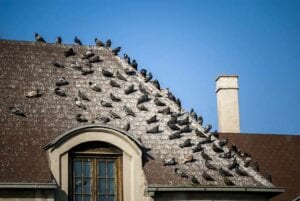
Dealing with an Overpopulation
If you inadvertently have fed the pigeons and you notice that you have a problem, call a pest control agent to assess the severity of the flock. Before they become a health hazard, or breed, or attract more feral pigeons, DO NOT FEED THEM! If you have bird feeders in your yard, be careful not to drop seed on the ground as this will also attract feral pigeons.
Source
Pigeon Patrol Products & Services is the leading manufacturer and distributor of bird deterrent (control) products in Canada. Pigeon Patrol products have solved pest bird problems in industrial, commercial, and residential settings since 2000, by using safe and humane bird deterrents with only bird and animal friendly solutions. At Pigeon Patrol, we manufacture and offer a variety of bird deterrents, ranging from Ultra-flex Bird Spikes with UV protection, Bird Netting, 4-S Bird Gel and the best Ultrasonic and audible sound devices on the market today.
Voted Best Canadian wholesaler for Bird Deterrent products ten years in a row.
Contact us at 1- 877– 4– NO-BIRD, (604) 585-9279 or visit our website at www.pigeonpatrol.ca
Pigeon/Pigeon Patrol / Pigeons Roosting / Vancouver Pigeon Control /Bird Spikes / Bird Control / Bird Deterrent / Pigeon Deterrent? Surrey Pigeon Control / Pest /Seagull deterrent / Vancouver Pigeon Blog / Birds Inside Home / Pigeons in the cities / Ice Pigeons/ What to do about pigeons/ sparrows , Damage by Sparrows, How To Keep Raccoons Away, Why Are Raccoons Considered Pests/ De-fence / Pigeon Nesting/ Bird Droppings / Pigeon Dropping/ woodpecker control/ Professional Bird Control Company/ Keep The Birds Away/ Birds/rats/ seagull/pigeon/woodpecker/ dove/sparrow/pidgeon control/pidgeon problem/ pidgeon control/flying rats/ pigeon Problems/ bird netting/bird gel/bird spray/bird nails/ bird guard







